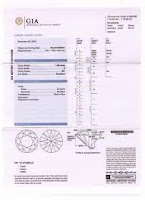Before you start shopping for diamonds, consider dealing with a bonded jeweller. Bonded jewellers sell bonded diamonds, and there are very few bonded jewellers in the world. In fact, out of all of the jeweller’s in the world, only about 5% of them are bonded. Buying a bonded diamond will cost more than buying a non-bonded diamond, but when you look at what you get with the bonded option, you will see that it is well worth the extra expense.
Buy-Back Policy
First, bonded diamonds have a buy back policy for the life of the diamond. No matter how long you have had the diamond, you can take it back to the bonded jeweller and sell it back to him or her, for a 100% refund. If a jeweller does not offer a 100% buy back guarantee, for the life of the diamond, then you should take a closer look at the diamond to see what is wrong with it.
Breakage Policy
Bonded diamonds also have a breakage policy. If the stone breaks or chips, the bonded jeweller will replace it with a new one – one time. No jeweller would ever offer such a policy on any stone that was not 100% natural, so just the offer of such a policy should give you piece of mind concerning the quality of the diamond. Bonded diamonds are natural and untreated.
Market Value
Bonded diamonds increase in value, with a fixed appreciation rate that is designed to keep up with inflation. This means that a diamond that is worth a certain amount of money today will be worth more in the future, as the price of diamonds continues to rise. This generally does not apply to buy backs, however. It typically applies to trade-ins.
Alternately, by purchasing a bonded diamond, you are protected against the possibility of a market crash. If a market crash occurs, the value of diamonds will drop. However, the bonded jeweller guarantees to refund you the difference between what the diamond is now worth and what you paid for it before the market crash.
It may be difficult to find a bonded jeweller in your area, but if you can, this is who you want to deal with, as opposed to dealing with an un-bonded jeweller. Specifically tell the jeweller that you are only interested in bonded diamonds. You can find a bonded jeweller in your area by using various online resources, or by calling the local jewellery stores.














